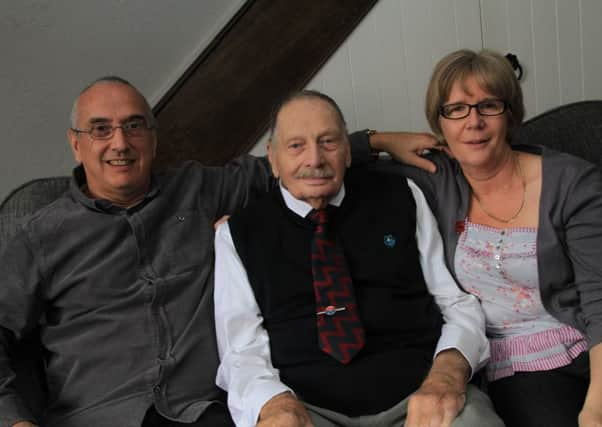Poet Maurice’s war of words


After soldier Maurice Crowther was released at the end of the war, he shut away his poems and never spoke of them again.
Norristhorpe man Maurice, who was captured in 1942 and spent three and a half years as a prisoner, died aged 93 on December 12.
Advertisement
Hide AdAdvertisement
Hide AdHe never spoke about his time in World War II until his great-grandson, Charlie, asked him about it shortly before he died.
And after Maurice’s death, his moving poems were unearthed by his daughter Julie Ward, who knew her dad had written them but had never read them.
Julie said: “I knew they existed but I didn’t know they were still around. I found them while we were clearing out my dad’s flat. My mum, who died several years ago, talked about them but my dad didn’t talk about the war at all – it was a taboo subject until about three years ago when he started to open up a bit to his great-grandson Charlie.
“I felt very mixed emotions when I found them. There were five though we think there would have been some more because the poems finish in January 1943 but he was captured until the end of the war.
Advertisement
Hide AdAdvertisement
Hide Ad“One, called New Year at Jinsen, is extremely difficult to read because I can empathise with his feelings. You think about what you do on New Year’s Eve and he was writing about what he was doing and thinking, and it breaks my heart.”
Her husband Stephen said: “Maurice was about 21 when he wrote the poems. He wasn’t particularly acamedic and that makes them even more poignant.”
After signing up in 1939, two weeks before the start of the war, he became a soldier in the 122 Royal Artillery Field Regiment.
He was captured fighting at the fall of Singapore on February 15, 1942, along with his best friend Norman Wood.
Advertisement
Hide AdAdvertisement
Hide AdHe was still fighting in the sea when when he ran out of ammunition and was taken prisoner with Norman.
Julie said: “There was a Japanese guard who heard that Maurice used to box for his regiment and he asked Maurice to give him lessons. This he willingly did as it gave him the opportunity to knock seven bells out of one of his tormentors with no fear of reprisal.
“He worked down the coal mines in Japan and was shocked as everyone, including local women, were stripped naked to the waist, something a good old Yorkshire lad wouldn’t expect to see.”
Working down the mines he broke his leg, but his life was saved by an American doctor in the POW camp at Fukuoka, who set his leg.
Advertisement
Hide AdAdvertisement
Hide AdHe was in a camp 150km from Nagasaki when the Americans dropped the atom bomb and saw the devastation on his train journey home after the camps were liberated.
Maurice, who was awarded six campaign medals, had to sign the Official Secrets to say he wouldn’t talk about what he saw after the atom bomb destroyed the area they travelled through. He was returned home by the Americans via the USA and Canada on an American ship.
After the war he returned to Liversedge and served in the police force before starting work at Heckmondwike Carpets. He also served as a Liversedge councillor.
He married Mary and had three children, 11 grandchildren and 14 great grandchildren. Julie said: “He wrote poetry for my mum but I have never seen any of that.”
Advertisement
Hide AdAdvertisement
Hide AdIn 2012 he was awarded a National Lottery grant to take him back out to the Far East, to visit the grave of his best friend, Norman Wood. Norman was sent to work on the death railway in Burma.
That same year, Maurice was invited to a special Buckingham Palace Garden Party for JAVA Far East POW veterans and was featured on the BBC’s Remembrance Parade programme, when his daughter Julie Ward pushed him in a wheelchair past the Cenotaph and the Queen.
Stephen said: “In Britain, VE Day was the end of the war. All the lads came home from Europe but it was six months after that the lads from Japan were liberated, and then another six months before they came home. They were forgotten.
“The 122nd field regiment of the Royal Artillery was disbanded at the end of the war and Maurice was aggrieved at the thought of it becoming the Forgotten Regiment. We felt it was fitting for him to go out to poetry and I wrote a poetic obituary.”
Advertisement
Hide AdAdvertisement
Hide AdMaurice’s war poems, uncovered after so many years, will serve as a reminder of the horrors experienced by soldiers in the Far East, and ensure they won’t be forgotten again.
l Pictures and information courtesy Sean Stewart.